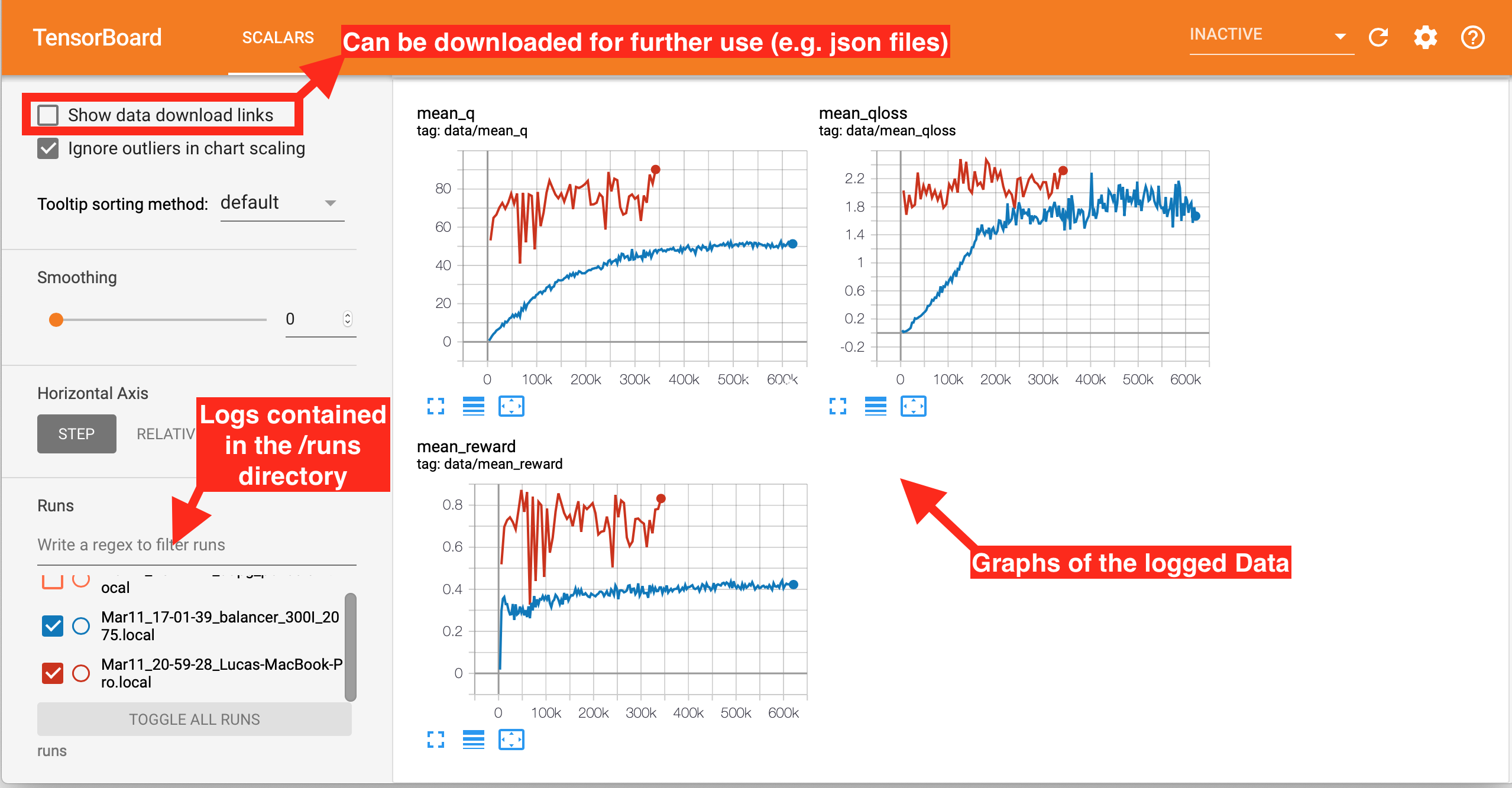Implementation of the Deep Deterministic Policy Gradient (DDPG) and Maximum A Posteriori Policy Optimization (MPO) Reinforcement Learning Algorithms for continuous control on OpenAI gym environments.
To use the Algorithms will require python3 (>=3.6.5).
-
This should install all dependencies and the packages (cloning -> into a directory of choice):
git clone https://github.com/theogruner/rl_pro_telu cd rl_pro_telu pip install -e .
-
Or they can be installed manually
Installation gym: https://github.com/openai/gym
Installation quanser: https://git.ias.informatik.tu-darmstadt.de/quanser/clients/tree/master
Additionally PyTorch, Numpy, Tensorflow, TensorboardX are required.
The algorithms are intended for continuous gym environments !
-
Usage with provided noises (Ornstein Uhlenbeck, Adaptive Parameter)
If you want to use DDPG with our pre-implemented noises you can simply do this via the main_ddpg.py file.
-
Training on the Qube-v0 (can be replaced with any environment id e.g. Levitation-v0) environment with default hyperparameters and Ornstein-Uhlenbeck noise, saving the model as furuta_model.pt and the log in furuta_model (saves by default as ddpg_model.pt, and log in a automatic generated directory). Saving/logging could be disabled with --no-save and --no-log
python3 path/to/main_ddpg.py --env Qube-v0 --save_path furuta_model.pt --log_name furuta_log
-
Loading a saved model and evaluating it in the Qube-v0 environment. Number of episodes and their length for testing can be adapted with --eval_episodes and --eval_ep_length
python3 path/to/main_ddpg.py --env Qube-v0 --no-train --eval --load furuta_model.pt
-
Training and evaluating are executed sequentially, so if u want to evaluate a just trained model, this will work:
python3 path/to/main_ddpg.py --env Qube-v0 --train -eval --save_path furuta_model.pt --log_name furuta_log
-
Loading a model and setting the train flag will continue training on the loaded model
python3 path/to/main_ddpg.py --env Qube-v0 --train -eval --save_path furuta_model.pt --log_name furuta_log --load furuta_model.pt
-
Adapting hyperparameters is quite intuitive:
python3 path/to/main_ddpg.py --env Qube-v0 --gamma 0.5 --tau 0.1 --batch_size 1024
-
For more information, e.g. about adaptable hyperparameters, use:
python3 path/to/main_ddpg.py --help
-
-
Usage with self defined noise
To use a self defined noise you will need to write a script by yourself.
-
Make sure the script is the same directory as the ddpg package (only if you didn't install them with PyPI).
-
The noise should extend the Noise class in noise.py (contain a reset and iteration function)
-
Following examples cover previous examples functionality
import gym import quanser_robots from ddpg import DDPG from ddpg import OrnsteinUhlenbeck # create environment and noise env = gym.make('Qube-v0') action_shape = env.action_space.shape[0] noise = OrnsteinUhlenbeck(action_shape) # setup a DDPG model w.r.t. the environment and self defined noise model = DDPG(env, noise, save_path="furuta_model.pt", log_name="furuta_log") # load a model model.load_model("furuta_model.pt") #trains the model model.train() #evaluates the model and returns a meaned reward over all episodes mean_reward = model.eval(episodes=100, episode_length=500) print(mean_reward) # always close the environment when finished env.cose()
-
Setting Hyperparameters would look something like this:
model = DDPG(env, noise, gamma=0.5, tau=0.1, learning_rate=1e-2)
-
-
Using a model as a controller
If you want to use your a model as a simple controller just call the model passing an observation:
ctrl = DDPG(env, noise) ctrl.load('furuta_model.pt') while not done: env.render() act = ctrl(obs) obs, rwd, done, info = env.step(act) # always close the environment when finished env.close()
Using MPO is analogous to ddpg
-
Use main_mpo.py instead of main_ddpg.py
-
For information on the parameters you can set: python3 main_mpo.py --help
-
Due to no noise needed writing an own script is not necessary but for completeness a little code snippet as example:
import gym import quanser_robots from mpo import MPO env = gym.make('Qube-v0') model = MPO(env, save_path="furuta_model.pt", log_name="furuta_log") # continues like DDPG example ...
By default logging is enabled and safes the logs in the runs/ directory. Name of the logs can be set by the log_name parameter (--log_name argument). Inspecting them works with:
tensorboard --logdir=*/PATH/TO/runs*This starts a local server, which can be accessed in the browser. Connecting to the server should result in something like this:
Please read CONTRIBUTING.md for details on our code of conduct, and the process for submitting pull requests to us.
- theogruner - theogruner
- DariusSchneider - DariusSchneider
See also the list of contributors who participated in this project.
This project is licensed under the GNU GPL3 License - see the LICENSE file for details
